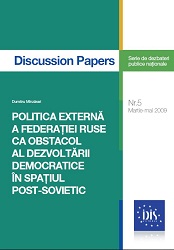Politica Externă a Federaţiei Ruse ca obstacol al dezvoltării democratice în spaţiul Post-Sovietic
The Foreign Policy of the Russian Federation as an obstacle to democratic development in the Post-Soviet space
Author(s): Dumitru Minzarari
Subject(s): International relations/trade, Security and defense, Post-Communist Transformation, Peace and Conflict Studies
Published by: IDIS VIITORUL Institutul pentru Dezoltare şi Initiative Sociale
Keywords: Moldova-Russia-relations; post-Soviet Foreign Policy;
Summary/Abstract: It is even quite difficult to understand how Russia is obstructing the process of democratic transition in post-Soviet states because of the subtle tools and methods used by the Kremlin. In fact, Russia has returned to the mechanisms of indirect aggression practiced by the Soviet Union during the Cold War. Then, understanding the enormous danger of a nuclear war, which could have been triggered by direct armed clashes with the United States, the Soviet Union confronted its enemy in third world states through proxy wars. As the provisions of international law do not address the field of indirect aggression well, Russia is free to unleash such hostile actions against its neighbors. The paper will also superficially address these aspects, i.e. the gaps in international law, which, in modern conditions, leads to the transformation of interstate aggression mechanisms. The main purpose of the study, however, will remain to investigate how to use indirect aggression in Russia's foreign policy, in order to generate the regression of the democratic transition in Moldova. The next chapter will elucidate the preponderance of the foreign factor, more precisely of the Russian foreign policy, over the domestic, domestic factor, in directing the political processes and the internal development of the examined post-Soviet states.
Series: IDIS DIscussion Papers
- Page Count: 50
- Publication Year: 2009
- Language: Romanian
- Content File-PDF

